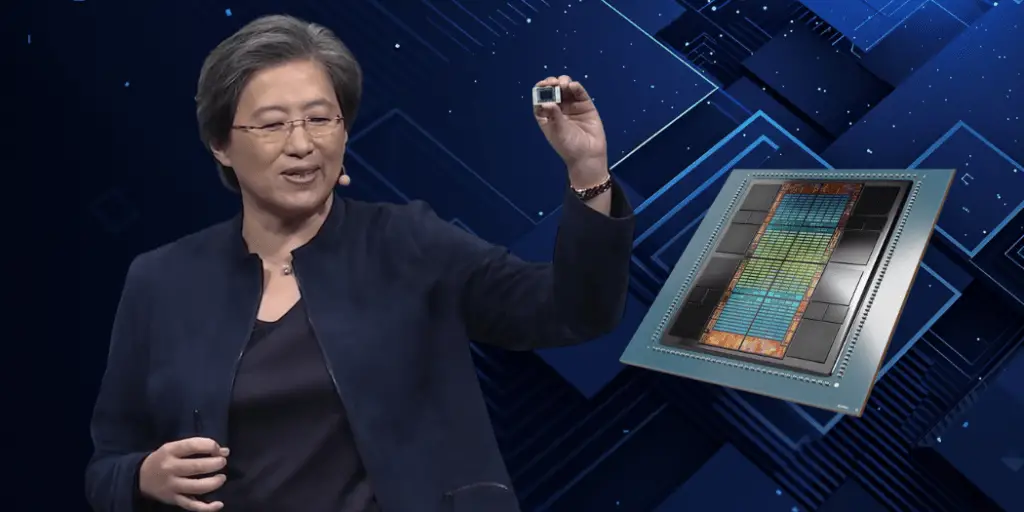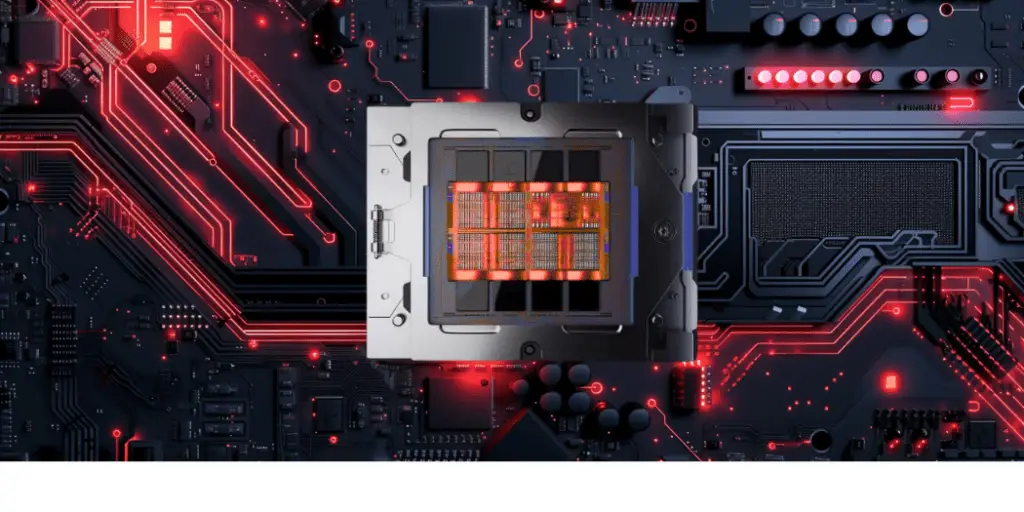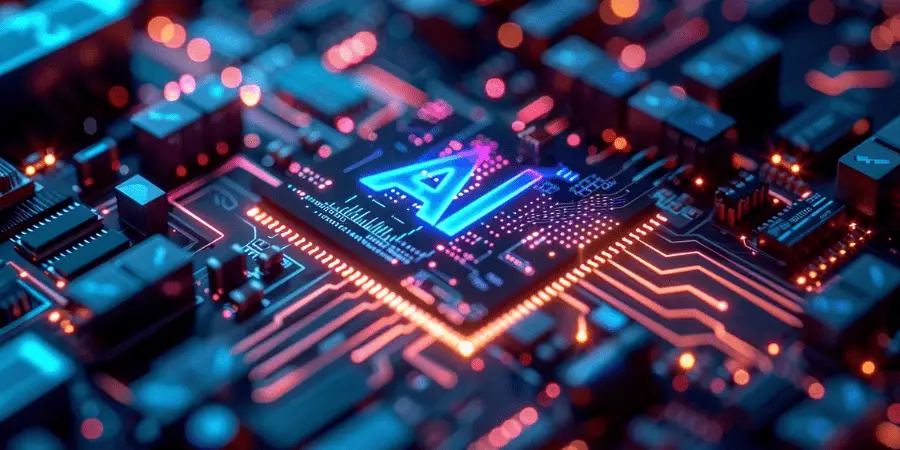Advanced Micro Devices has made a significant announcement at Computex 2024, releasing a new series of artificial intelligence. AMD New AI Chips are designed to challenge the current market leader, Nvidia.
The highlight of AMD’s presentation was introducing the MI400 series, which is expected to arrive in 2026 and will feature an innovative architecture dubbed “Next.”
This move marks a strategic push by AMD to capture a larger share of the lucrative AI semiconductor market, which Nvidia currently dominates.
AMD’s New AI Chips
AMD CEO Lisa Su introduced the company’s latest advancements in artificial intelligence processors, marking a significant step in their efforts to challenge Nvidia’s dominance.
Among the key announcements was the MI325X accelerator, which is set to be released in the fourth quarter of 2024. This accelerator represents AMD’s immediate response to the growing demand for high-performance AI chips for data centers supporting generative AI applications.
In addition to the MI325X, AMD released the upcoming MI350 series, expected to be available in 2025.
The MI350 series boasts a remarkable improvement over its predecessor, the MI300, with a 35-fold increase in inference performance, significantly enhancing the capability to compute generative AI responses.
AMD revealed plans for the MI400 series, slated for a 2026 release. This new series will be built on an advanced architecture known as “Next,” which is anticipated to bring substantial advancements in AI processing power and efficiency.
These innovations reflect AMD’s commitment to keeping pace with the rapid evolution of AI technology and its dedication to providing competitive alternatives to Nvidia’s offerings.

AMD also showcased its new neural processing units, which are designed to handle on-device AI tasks in AI PCs.
This highlights AMD’s strategic focus on data center applications and enhancing AI capabilities at the device level, which is expected to drive growth in the PC market as it recovers from a prolonged slump.
Competitive Landscape
Nvidia commands about 80% of the AI semiconductor market. Its stronghold is supported by its advanced technology and robust product lineup, which caters to the increasing demand for AI chips in data centers and other applications.
AMD’s recent announcements at Computex 2024 represent a direct challenge to Nvidia’s dominance.
Nvidia has set a high bar with its rapid innovation cycle, announcing plans to shorten its release cycle annually. This approach ensures that Nvidia consistently offers the latest and most potent chips to meet the evolving needs of AI applications.
AMD has also adopted an annual release cadence, aiming to keep pace with Nvidia and maintain a competitive portfolio.
The stock performance of the two companies highlights the intense competition. Since the start of 2023, Nvidia’s shares have surged more than sevenfold, reflecting investor confidence in its leadership in AI semiconductors.
In contrast, although more than doubling in value, AMD’s shares have not matched Nvidia’s meteoric rise. Despite this, AMD’s strategic moves and new product announcements have garnered positive reactions from industry analysts and investors.
AMD’s strategy is leveraging technological advancements to offer compelling alternatives to Nvidia’s products. The MI325X accelerator, the MI350 series, and the future MI400 series are all designed to provide significant performance improvements and meet the high demands of generative AI applications.
By doing so, AMD aims to attract companies looking for alternatives to Nvidia, potentially disrupting Nvidia’s stronghold.
Nvidia’s upcoming Rubin platform, which will include GPUs, CPUs, and networking chips set to roll out in 2026, indicates that the competition will remain fierce. Both companies heavily invest in R&D to stay ahead in the fast-paced AI chip market.
AMD’s CEO, Lisa Su, emphasized the company’s dedication to AI as its top priority, harnessing all available development capabilities to maintain a competitive edge.
Technological Advancements
At Computex 2024, AMD unveiled several significant technological advancements in its AI chip lineup, aimed at positioning the company as a formidable competitor to Nvidia.
The architectural innovations and performance enhancements in their new series of AI processors are central to these advancements.
One of the highlights of AMD’s announcement was the detailed architecture of its new neural processing units (NPUs). These NPUs are designed for on-device AI tasks in AI PCs, emphasizing the importance of localized processing power in AI applications.
By enabling AI computations to be performed directly on devices, AMD’s NPUs reduce the dependency on cloud-based data centers, leading to faster response times and improved efficiency for AI tasks such as voice recognition, image processing, and predictive analytics.
Set for release in the fourth quarter of 2024, the MI325X accelerator represents a significant leap in AMD’s AI capabilities. This accelerator is engineered to handle the complex requirements of AI data centers, supporting the growing demand for generative AI programs.
The MI325X is expected to deliver enhanced performance and energy efficiency, making it a competitive alternative to Nvidia’s current offerings.
Looking ahead to 2025, AMD introduced the MI350 series, which promises a 35-fold improvement in inference performance compared to the MI300 series.
Inference, the process of generating AI responses from trained models, is critical for natural language processing and real-time data analysis applications.

The MI350’s substantial performance boost highlights AMD’s commitment to pushing the boundaries of AI processing power, ensuring its chips can handle increasingly complex AI tasks more effectively. Perhaps the most groundbreaking announcement was the MI400 series, expected to launch in 2026.
This series will be built on a new architecture called “Next,” which is anticipated to bring unprecedented advancements in AI processing.
The “Next” architecture is designed to provide higher computational power, improved energy efficiency, and better scalability, enabling AI applications to reach new levels of sophistication and performance.
AMD’s technological advancements are not just about keeping up with Nvidia but also about providing unique solutions that address the evolving needs of the AI market.
AMD aims to attract businesses seeking alternatives to Nvidia’s dominant solutions by introducing innovative architectures and significantly improving performance metrics.
Market Impact
The release of AMD’s new AI chips has immediately impacted the stock market. While AMD’s shares remained relatively flat following the announcement, Nvidia’s shares rose by more than 3%.
This reaction underscores investors’ high expectations and confidence in Nvidia’s continued dominance in the AI semiconductor market. However, it also highlights the competitive pressure Nvidia faces as AMD ramps up its AI capabilities.
Since the start of 2023, AMD’s stock value has more than doubled, reflecting growing investor confidence in its strategic direction and technological advancements.
Despite this impressive growth, AMD’s surge pales compared to Nvidia’s performance, which has seen a more than seven-fold increase in its stock value during the same period.
This disparity indicates that while AMD is making significant strides, it still has substantial ground to cover to match Nvidia’s market influence.
Investors are closely watching the developments in the AI chip market, particularly the moves by leading firms like AMD and Nvidia.
The race to develop generative AI technologies has driven massive investments in AI data centers and the advanced chips needed to support these applications.
As a result, longer-term updates from chip manufacturers are crucial for investors to gauge the sustainability and potential growth of their investments in the AI sector.
AMD’s CEO, Lisa Su, expressed confidence in the company’s AI strategy, projecting approximately $4 billion in AI chip sales for 2024, an increase of $500 million from previous estimates.
This upward revision indicates AMD’s optimism about capturing a larger share of the AI chip market and delivering robust financial performance.
The competitive landscape between AMD and Nvidia is intensifying. AMD’s introduction of the MI325X accelerator, the MI350 series, and the future MI400 series aims to provide alternatives to Nvidia’s offerings and attract companies seeking diverse AI chip solutions.
By adopting an annual release cycle similar to Nvidia’s, AMD demonstrates its commitment to staying competitive and continuously enhancing its product portfolio.
Bob O’Donnell, chief analyst at Technalysis Research, noted that AMD’s aggressive strategy will likely be well-received by companies looking for alternatives to Nvidia.

This sentiment suggests that AMD’s innovations and strategic moves could disrupt Nvidia’s market stronghold and provide new opportunities for growth in the AI semiconductor industry.
The AI semiconductor market is poised for substantial growth as businesses increasingly prioritize spending on AI chips for data centers. AMD’s focus on enhancing AI capabilities in both data center and on-device applications positions it well to capitalize on this trend.
The company’s new neural processing units for AI PCs highlight its efforts to drive growth in the PC market by integrating advanced AI features.


